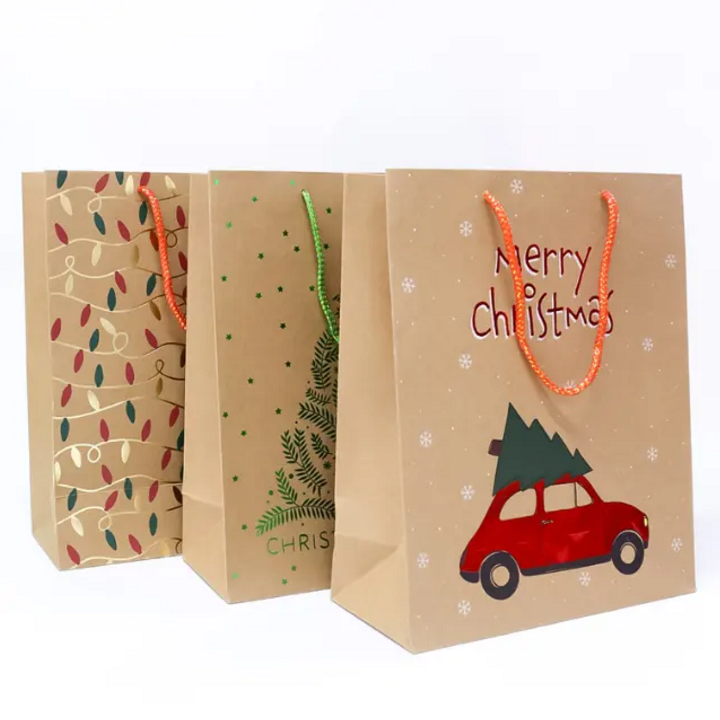Content Menu
● Introduction to Paper Bags
>> Benefits of Using Paper Bags
● Materials Needed
● Step-by-Step Instructions
>> Prepare Your Paper
>> Fold the Paper
>> Create the Bottom of the Bag
>> Assemble the Bag
>> Add Handles (Optional)
● Customization Ideas
● Practical Uses for Your Paper Bag
● Environmental Impact of Paper Bags
● Conclusion
● Frequently Asked Questions
>> 1. What type of paper is best for making bags?
>> 2. Can I use old newspapers to make a bag?
>> 3. How much weight can a homemade paper bag hold?
>> 4. Are there any downsides to using paper bags?
>> 5. Can I recycle my homemade paper bags?
● Citations:
Making a paper bag is a straightforward and rewarding craft that can be done using minimal materials. In an age where sustainability is increasingly important, creating your own paper bags can help reduce reliance on plastic. This article will guide you through the process of making a simple paper bag, discuss its benefits, and provide additional insights into the use of paper bags in today's world.

Introduction to Paper Bags
Paper bags have been a staple in packaging for decades. They are commonly used in retail settings for carrying groceries, gifts, and other items. Unlike plastic bags, which contribute significantly to environmental pollution, paper bags are biodegradable and can be recycled. This makes them a more eco-friendly option.
Benefits of Using Paper Bags
- Eco-Friendly: Paper bags are made from renewable resources and decompose naturally.
- Versatile: They can be used for various purposes, including shopping, gift wrapping, and storage.
- Customizable: Paper bags can be easily decorated or printed with logos for branding purposes.
- Strong and Durable: When made correctly, paper bags can hold substantial weight without tearing.
Materials Needed
To make a simple paper bag, you will need the following materials:
- A sheet of paper (preferably kraft or recycled paper)
- Scissors
- Glue or tape
- Ruler
- Pencil
- Optional: Decorative items (stickers, markers) for customization
Step-by-Step Instructions
Here's a detailed guide on how to create your own paper bag:
Prepare Your Paper
Start by selecting the type of paper you want to use. A standard sheet of A4 or letter-sized paper works well. If you want a sturdier bag, consider using kraft paper.
1. Lay the sheet of paper flat on your workspace.
2. Use the ruler to measure and mark the dimensions of the bag. A common size is 12 inches tall by 10 inches wide.
Fold the Paper
1. Create the Main Body:
- Fold the paper in half vertically (lengthwise) so that the shorter sides meet.
- Unfold it back to reveal a crease down the center.
2. Form the Sides:
- Fold each side towards the center crease about 2 inches.
- This will create two flaps that will form the sides of your bag.
Create the Bottom of the Bag
1. Fold about 3 inches from the bottom edge upwards.
2. Open up this fold slightly to create a base for your bag.
3. Fold each corner of this section inward towards the center to form triangles; this will help stabilize the base.
Assemble the Bag
1. Apply glue or tape along the edges where you made folds to secure them.
2. Press down firmly to ensure that everything sticks together well.
3. Once secured, fold down the top edge about an inch to create a finished look.
Add Handles (Optional)
If you want to add handles:
1. Cut two strips of paper (about 1 inch wide and 10 inches long).
2. Attach them to either side of the bag using glue or tape.

Customization Ideas
Once your bag is assembled, you can personalize it:
- Use markers or paints to decorate with patterns or messages.
- Stick on labels or stickers for branding if you're using them for business purposes.
- Consider adding embellishments like ribbons or washi tape for a decorative touch.
Practical Uses for Your Paper Bag
Your homemade paper bag can serve various purposes:
- Grocery shopping
- Gift wrapping
- Storage for small items
- Craft projects
Environmental Impact of Paper Bags
Switching from plastic to paper bags has significant environmental benefits:
- Biodegradability: Paper bags break down naturally in landfills within months compared to plastic, which can take hundreds of years.
- Recycling Potential: Most communities have recycling programs for paper products, allowing for repurposing into new products.
However, it's essential to consider that producing paper bags requires trees and energy; therefore, responsible sourcing is crucial.
Conclusion
Making your own simple paper bag is not only an enjoyable craft but also contributes positively to environmental sustainability. By choosing to use homemade paper bags instead of plastic ones, you are making a conscious choice towards reducing waste and promoting eco-friendliness in your daily life.
In summary, here are key points discussed in this article:
- The process of making a simple paper bag.
- The materials required and step-by-step instructions.
- Customization ideas to make your bag unique.
- The environmental impact and benefits of using paper bags over plastic ones.
Creating your own paper bags is a fun activity that can be shared with family and friends while promoting sustainability.

Frequently Asked Questions
1. What type of paper is best for making bags?
Kraft paper is ideal due to its strength and durability, but any sturdy recycled paper will work well.
2. Can I use old newspapers to make a bag?
Yes! Old newspapers can be used creatively to make smaller gift bags or decorative items.
3. How much weight can a homemade paper bag hold?
The weight capacity depends on the thickness and type of paper used; generally, kraft paper bags can hold several pounds if constructed properly.
4. Are there any downsides to using paper bags?
While they are eco-friendly, they are not waterproof and may not hold up as well under wet conditions compared to plastic bags.
5. Can I recycle my homemade paper bags?
Yes! As long as they are made from recyclable materials without excessive glue or non-recyclable decorations, they can typically be recycled with other paper products.
Citations:
[1] https://www.instructables.com/Paper-Bag-1/
[2] https://www.youtube.com/watch?v=ESuxIr_i1XI
[3] https://www.linkedin.com/pulse/how-write-2000-word-how-to-post-elnel-andrew-roque
[4] https://blog.hubspot.com/marketing/the-ins-and-outs-of-writing-long-form-content
[5] https://www.canadabrown.com/21-things-you-should-know-about-paper-bags/
[6] https://www.dailymotion.com/video/x7sztmw
[7] https://www.youtube.com/watch?v=xRDoSMRP54E
[8] https://ecofolds.com/faq/
[9] https://www.youtube.com/watch?v=WwgAFahGyQQ
[10] https://www.primelineretail.com/blogs/news/top-questions-regarding-brown-kraft-paper-bags
































